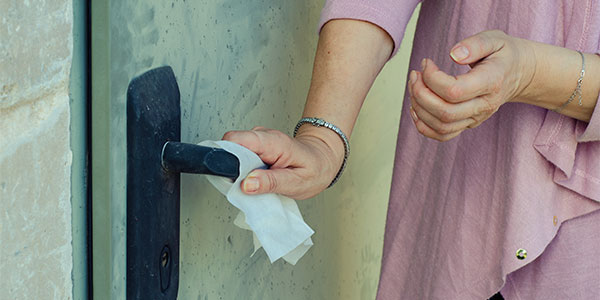OCD is an anxiety disorder that can be incredibly debilitating. It’s also common, and many people suffer from it. In this article, we will explore OCD mental rituals in depth. We will talk about what they are, how they form, and what you can do to try and break them. From there, we will provide tips on how to deal with the disorder daily. So if you or someone you know is suffering from OCD mental rituals, read on for insights and hope for a better future.
Contents
What are Mental Rituals In OCD?

Mental rituals are often a hallmark of OCD, and can be defined as any repetitive behavior or thought that is done to ease the individual’s anxiety or distress. Mental rituals can take many different forms, from hand-washing to thinking about a certain number or phrase over and over again.
There is no definitive answer as to why mental rituals are common in individuals with OCD, but some hypothesize that they may help to regulate the individual’s thoughts and feelings. Mental rituals may also provide a sense of control during an anxious or chaotic period and may help the individual focus on specific tasks at hand.
Regardless of their reasons, mental rituals can be extremely problematic for individuals with OCD. They can lead to increased anxiety and stress levels, as well as decreased productivity and efficiency. In some cases, mental rituals can even become so entrenched that they interfere with the individual’s normal life functioning.
Reasons for Mental Rituals In OCD
There is no definitive answer to this question. However, some experts believe that mental rituals may be a result of an individual’s attempts to reduce anxiety and fear. Additionally, mental rituals may also be a way for individuals with OCD to manage their thoughts and emotions. Whatever the reason, mental rituals can be very crippling and frustrating for those with OCD.
Some of the other reasons can be:
- Stressful Events: Sometimes a stressful event or situation can trigger obsessive thoughts and mental rituals.
- Fear of Harm: People with OCD may develop mental rituals as a way to protect themselves from perceived danger or harm. For example, someone may obsessively check that their doors are locked at night to prevent a break-in.
- Perfectionism: Some individuals with OCD may feel the need to constantly strive for perfection in all aspects of their life. This may lead them to develop mental rituals that they use to “check” or “confirm” that everything is perfect and meet their high standards.
- Inability To Control Thoughts: People with OCD often have difficulty controlling their intrusive thoughts and can become overwhelmed by them. As a result, they may resort to mental rituals to help them manage their thoughts.
- Obsessive Beliefs: Those with OCD may develop certain beliefs that become part of their mental rituals. For example, an individual may believe that if they perform a certain ritual, it will bring them good luck or prevent bad things.
Types of Mental Rituals In OCD

There are many different types of mental rituals that people with OCD often engage in. Some mental rituals involve repeated thoughts or actions that help the person feel balanced or regulated. Other mental rituals may consist of specific objects, words, or symbols that the person believes help them to avoid danger or negative thoughts.
Some of these OCD mental rituals are:
Repeating Words
One of the most common OCD mental rituals is repeating words or phrases to feel in control. People with OCD may repeat words or phrases like “everything’s going to be okay” or “I am safe.” Repeating these words helps the person feel reassured and reduces the likelihood of experiencing anxiety or panic.
Walking
People with OCD often engage in repetitive walking rituals to regulate their thoughts and feelings. For example, they may walk in a specific direction or pace themselves according to a set schedule. Walking can also help reduce anxiety and stress.
Checking Objects
People with OCD often check objects for potential dangers or signs of bad luck. This can include looking for mismatched socks, checking the locks on doors, and running through checklists of things to make sure everything is in order. Checking objects helps reduce anxiety and stress, as well as keep the person feeling safe and secure.
Observing Rituals
People with OCD often observe specific rituals or patterns to feel in control. This can include counting or repeating certain words, phrases, or numbers, checking the time multiple times a day, or following a set routine at work or home. Observing rituals helps reduce anxiety and stress, and gives the person some sense of stability and order.
Compulsively Cleaning
People with OCD often compulsively clean to reduce the likelihood of thinking or feeling negative thoughts or being in danger. This can include cleaning every nook and cranny, checking the locks on doors multiple times a day, or scrubbing pots and pans until they’re shiny.
How Do Mental Rituals Impact OCD?
Mental rituals are a common feature of OCD, and many people with the disorder engage in them. Mental rituals can be anything from repeating a certain phrase or action over and over again to counting specific numbers to pleasing thoughts or images. While mental rituals can be enjoyable at the moment, they often have negative consequences down the line.
The main reasons mental rituals can lead to problems are the:
Takes Up a Lot of Energy
One of the most common reasons mental rituals can be problematic is that they take up a lot of energy. Because people with OCD tend to focus on ritualized behavior in an attempt to avoid the feared situation, it can be difficult for them to get other things done. This can lead to chronic fatigue and other physical problems, as well as decreased productivity.
Can Cause Confusion and Stress
Mental rituals often involve a lot of mental repetition and concentration, which can lead to confusion and stress. When these symptoms are combined with the obsession and compulsion that are common features of OCD, it can be very difficult for people to carry out their rituals successfully. This can lead to frustration and even anger, which can further add to the distress of the individual with OCD.
Can Lead to Negative Self-Beliefs
Mental rituals can also lead to negative self-beliefs. People with OCD often believe that they are unable to do things without engaging in their rituals, which can create feelings of shame and inferiority. This may also lead people with OCD to feel like they need to engage in their rituals to feel good about themselves.
Cause Depression and Anxiety
Mental rituals can also lead to depression and anxiety. People with OCD often experience a lot of negative emotions as a result of their disorder, and these feelings may be exacerbated by the need to engage in mental rituals. This can lead to significant levels of stress and depression, which can make it difficult for people to function normally.
Can Result in Relationship Issues
Mental rituals can also lead to relationship issues. People with OCD often focus on the negative aspects of their relationships, which can lead to problems. They may become preoccupied with the idea that their partners are not compatible or that they will somehow hurt or betray them. This can create a lot of tension and conflict in the relationship, which is often difficult to repair.
How Can Mental Rituals Be Prevented or Stopped?

First and foremost, it’s important to understand that mental rituals aren’t caused by anything external. Rather, they’re the result of an individual’s thoughts and feelings. These are some of the tips on how these mental rituals can be either managed or prevented:
1. Recognize The Signs of Mental Rituals
If you notice that you’re engaging in recurrent mental rituals, it may be helpful to track down the specific thoughts or feelings that are driving them. This will help you to better identify why you’re choosing to repeat these activities, and hopefully allow you to make changes that will prevent them from happening in the future.
2. Don’t Dwell on Negative Thoughts
When negative thoughts or feelings are allowed to take control, they can lead to habitual patterns of thinking and behaving. Trying to avoid these emotions altogether may not be an effective long-term solution, as they’ll eventually find a way into your mind regardless. Instead, focus on accepting and acknowledging them, while ultimately working towards moving on from them.
3. Be Mindful of the Effect of Mental Rituals
Mental rituals can have a significant impact on your daily life, both socially and mentally. If they’re causing significant distress or affecting your work or school performance, it may be time to reconsider their importance in your life. It’s also important to remember that mental rituals don’t have to be negative – sometimes simply repeating an activity can bring joy and happiness.
4. Seek Professional Assistance
If mental rituals are causing significant distress or affecting your overall quality of life, it may be worth seeking professional help. A therapist or counselor can provide you with guidance on how to address the root causes of your rituals, and may also be able to provide additional support during the process.
5. Practice Mindfulness and Meditation
Mindfulness and meditation are both techniques that are effective in managing mental rituals. By becoming more aware of your thoughts and feelings, you can begin to recognize when they’re starting to take control and try to take some steps back. Additionally, mindfulness can help you to focus on the present moment, which can reduce the amount of stress and anxiety that comes from habitual thinking patterns.
6. Challenge and Reframe Your Mental Rituals.
If mental rituals are causing significant distress or affecting your overall quality of life, it may be worth trying to challenge and reframe them. This can be done by looking at the activity itself from a different perspective and interpreting it more positively. For example, you could view your ritual of reading the news as an opportunity to learn and grow, rather than a negative task that needs to be completed.
Conclusion
OCD mental rituals can be extremely disturbing and make everyday life very difficult. However, with the right help, these rituals can be overcome. If you or someone you know is suffering from OCD, it is important to seek out professional help as soon as possible. By doing so, you will not only get the support you need but also learn how to deal with OCD on your own in a way that works best for you.
For more information and guidance, please contact MantraCare. OCD is a mental health disorder characterized by obsessions and compulsions. If you have any queries regarding Online OCD Counseling experienced therapists at MantraCare can help: Book a trial OCD therapy session now.


